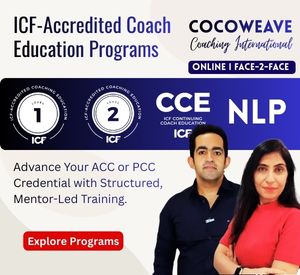Several years ago, I hired a coach to support my developmental journey and learn from his coaching style.
Early on, out of the blue, he asked about my spiritual practice. I was confused and said that I was not religious. He tried to clarify, “How do you connect with your most intimate being?” He threw in words like chakras and Dharma. I was lost and frustrated. I wanted to learn how to become a great coach, gain confidence and launch my business; how did this relate?
Despite my attempts to shift the topic, he continued to share the benefits of finding a spiritual practice. My homework included meditation and prayer. He even went so far as to say that I couldn’t coach from a place of authenticity until I found spirituality.
I ended the coaching relationship early.
At the time, it sent me spinning. I wondered if he was right—that I wasn’t authentic—and I began willing my way through meditations and yoga classes. Nothing stuck.
Today, I am grateful for this experience; I learned a critical lesson: Meet your clients where they are.
Having a spiritual practice very well may be useful, but in that moment, being told to develop one was not what I needed. My coach’s relentless pursuit had the unintended impact of creating resistance and alienation; ultimately, I fired him.
As coaches, we learn research-based frameworks and practices for creating change. We move from unconscious incompetence to deep consciousness about how to create aha! moments and drive transformation.
Our challenge is to hold these foundational frameworks loosely, without “doing” them to our clients. Moving toward mastery is less about asking the right question or getting your client to improve and more about seeing the human being in front of you, being with them, and trusting what arises.
Why Meetings Clients Where They are Matters
As humans, we are wired for control. As coaches, we must manage this instinct. It’s natural to want your client to behave in a certain way, to take on the beliefs you “know” are right, and to make major shifts. However, the more we attempt to direct, the more futile our efforts become; our clients get defensive and shut down to learning. When we force-feed exercises, techniques and answers, clients recoil, or worse, they comply and transfer their resourcefulness to us.
As coaches, we aim to help our clients unlock their potential, tap into their creativity and resourcefulness, and learn from their actions. We must meet them where they are.
How to Meet Clients Where They Are
1. Get Curious
Start by understanding where the client is today, recognizing that they were somewhere else yesterday and will be somewhere new tomorrow. Discover what’s going on for them in this moment. My coach could have found out what was important to me about becoming a great coach and starting a business. What was I longing for at this stage?
2. Acknowledge and Appreciate
One of the joys of coaching is acknowledging and appreciating your client, this offers insight into their strengths and magnificence. My coach might have seen a strength of mine: building businesses from the ground up. Had he mirrored that back to me, I wonder what I might have started to see in myself? What had I been cultivating that I could now call upon?
3. Tune into Their Agenda
When you’re curious and tuned into your client’s strengths, you’ll uncover where the client really wants to go. You can challenge the client to lean into their fears and stretch beyond their comfort zone, in service of their vision.
Your challenges will be tied not to your experiences or what you know is best, but instead to their longings. My coach might have challenged me to quit my job, which I never would have accepted. But from there, we could have looked at what was holding me back. We might have uncovered that I wasn’t solid on my life purpose. It could have led to me spending time alone, connecting with my inner wisdom. I would have been less resistant because with my coach’s support, I might have realized that something deeper was missing.
4. Make an Offer
Finally, meeting clients where they are means that sometimes you offer suggestions and brainstorm together. You make sure your input is about them, not you. If you have something you think is valuable, offer it. But truly make it an offering, without attachment, so that the client does not feel compelled to accept.
Today, I have developed a spiritual practice, and I do believe that—for me—it’s additive to my coaching practice. But I developed it years later, at the time that was right for me. And I believe that I may have even gotten here earlier had my coach met me where I was.
Disclaimer
The views and opinions expressed in guest posts featured on this blog are those of the author and do not necessarily reflect the opinions and views of the International Coach Federation (ICF). The publication of a guest post on the ICF Blog does not equate to an ICF endorsement or guarantee of the products or services provided by the author.
Additionally, for the purpose of full disclosure and as a disclaimer of liability, this content was possibly generated using the assistance of an AI program. Its contents, either in whole or in part, have been reviewed and revised by a human. Nevertheless, the reader/user is responsible for verifying the information presented and should not rely upon this article or post as providing any specific professional advice or counsel. Its contents are provided “as is,” and ICF makes no representations or warranties as to its accuracy or completeness and to the fullest extent permitted by applicable law specifically disclaims any and all liability for any damages or injuries resulting from use of or reliance thereupon.
Authors
Post Type
Blog
Audience Type
Coach Educators, Experienced Coaches, External Coaches, ICF Chapter Leaders, Internal Coaches, New Coaches, Professional Coaches, Team and Group Coaches
Topic
Coaching Toolbox, Discover - Your Coaching Career
Related Posts
The Power of Active Listening in Meaningful Coaching: Why Active Listening is the Most Essential Coaching Competency
Of all the foundational coaching competencies identified by the International Coaching Federation…
Allyship in Action: Coaching as a Catalyst for Change
Allyship is often framed as a value or an intention. In practice,…
Grace Under Fire: Building Stress Resilience for Coaches and High Achievers
There’s a unique kind of pressure that lives at the intersection of…







